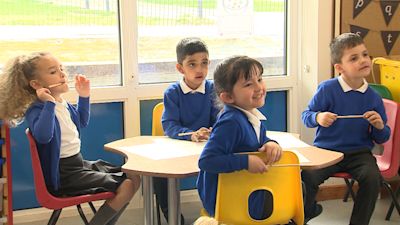Youngest children's development two terms behind because of pandemic, study warns

Watch Stuart Leithes' report for ITV News Anglia
The upheaval to education caused by the pandemic has left the development of the youngest school pupils on average two terms behind where it should be, a head teacher has warned.
Disruption to school life because of lockdowns has also left parents and schools feeling that children had been left disadvantaged in their social and emotional wellbeing, language and numeracy skills, a new report found.
A study commissioned by the Education Endowment Foundation found that the difference in performance between pre and post-pandemic groups equated to three more children in every class not reaching the levels expected on them.
In response, many schools have concentrated on emotional education for children in a bid to catch up ground lost to the pandemic, including at the Beeches Primary School in Peterborough.
On the morning ITV Anglia visited, the reception class was being read the book Grumpy Frog - a book chosen for its discussion of emotions, and teaching children how to recognise those feelings in themselves and others.
"For many of our youngsters they just haven't accessed the pre-school. So we are way behind, very often, where we would like pupils to be," said headteacher Tim Smith
"Now the children have caught up and in some respects they have developed well.
"They have gained their phonics through skilful teaching. It's taken a long time.
"I would say on average we are about two terms behind where we would like the children to be."
The study of reception year children aged four to five was focused on a cohort who were all aged three or four during the first lockdown from March 2020, while in the second and third lockdowns they were in their reception year.
Four and five-year-olds were less likely to meet expected levels of development in 2021 than before the pandemic, and the proportion of children in the sample reaching expected levels in all areas was 59% in 2021 compared with 72% for the 2019 cohort - equivalent to three extra pupils per class.
The report found the learning of all pupils had been negatively affected by the pandemic, but that the attainment gap between socially disadvantaged pupils and their peers had widened across all age groups, and that younger year groups were worst affected.
Becky Francis, chief executive of the EEF, said: "The early years are such a crucial time for children's development, both in terms of their attainment outcomes and their social and emotional wellbeing.
"So it is particularly concerning that fewer children reached the expected levels of development by the end of reception class."
Ruth Coleman, headteacher at Highfield Nursery School in Ipswich, said: "When children returned to our nursery after the pandemic, many struggled with vital aspects of early years development, such as personal touch, or coping in bigger groups of children.
"We saw more children who had separation anxiety from their parents, too. Some children were further behind with speech and language development than we'd expect.
"But we've also seen some positives too. We've developed our use of online technology platforms to better communicate with parents and families.
"We've also seen the benefits of sharing stories remotely. This has been a real boost for our children."
A Department for Education spokesperson said: "Our ambitious recovery plan continues to roll out across the country, with nearly £5bn invested in high quality tutoring, world class training for teachers and early years practitioners, additional funding for schools, and extending time in colleges by 40 hours a year.
"We are already seeing children making encouraging progress with two thirds of primary schools using the Nuffield Early Languages Intervention programme (NELI) along with over one million tutoring courses starting through the National Tutoring Programme."